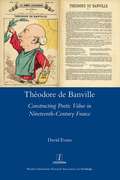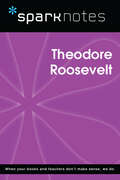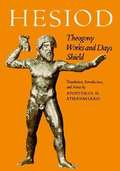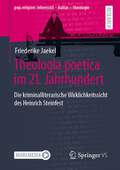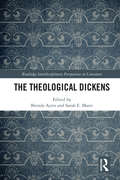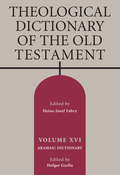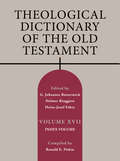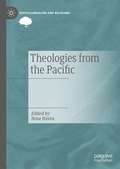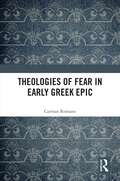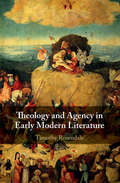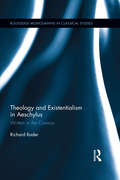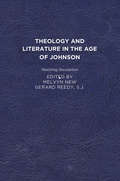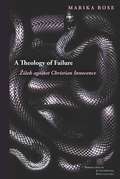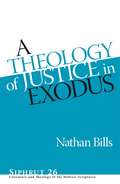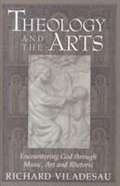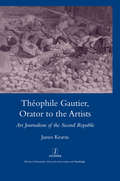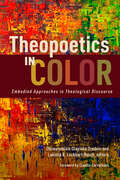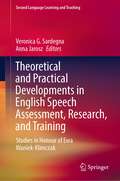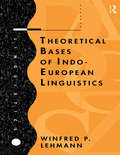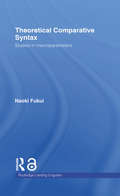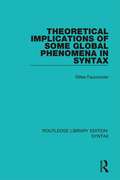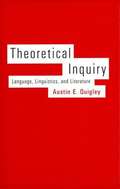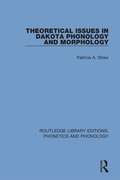- Table View
- List View
Theodore De Banville: Constructing Poetic Value in Nineteenth-century France
by David EvansTheodore de Banville (1823-1891) was a prolific poet, dramatist, critic and prose fiction writer whose significant contribution to poetic and aesthetic debates in nineteenth-century France has long been overlooked. Despite his profound influence on major writers such as Baudelaire, Rimbaud, Verlaine and Mallarme, Banville polarised critical opinion throughout his fifty-year career. While supporters championed him as a virtuoso of French verse, many critics dismissed his formal pyrotechnics, effervescent rhythms and extravagant rhymes as mere clowning. This book explores how Banville's remarkably coherent body of verse theory and practice, full of provocative energy and mischievous humour, shaped debates about poetic value and how to identify it during a period of aesthetic uncertainty caused by diverse social, economic, political and artistic factors. It features a detailed new reading of Banville's most infamous and misunderstood text, the Petit Traitede poesie francaise, as well as extended analyses of verse collections such as Les Stalactites, Odes funambulesques, Les Exiles, Trente-six Ballades and Rondels, illuminated by wide reference to Banville's plays, fiction and journalism. Evans elucidates not only aesthetic tensions at the heart of nineteenth-century French verse, but also a centuries-old tension between verse mechanisms and an unquantifiable, mysterious and elusive poeticity which emerges as one of the defining narratives of poetic value from the Middle Ages, via the Grands Rhetoriqueurs and Dada, to the experiments of the OuLiPo and beyond.
Theodore Roosevelt (SparkNotes Biography Guide)
by SparkNotesTheodore Roosevelt (SparkNotes Biography Guide) Making the reading experience fun! SparkNotes Biography Guides examine the lives of historical luminaries, from Alexander the Great to Virginia Woolf. Each biography guide includes:An examination of the historical context in which the person lived A summary of the person&’s life and achievements A glossary of important terms, people, and events An in-depth look at the key epochs in the person&’s career Study questions and essay topics A review test Suggestions for further reading Whether you&’re a student of history or just a student cramming for a history exam, SparkNotes Biography guides are a reliable, thorough, and readable resource.
Theogony, Works and Days, Shield
by Apostolos N. Athanassakis HesiodTranslation of 3 texts by Hesiod.
Theologia poetica im 21. Jahrhundert: Die kriminalliterarische Wirklichkeitssicht des Heinrich Steinfest (pop.religion: lebensstil – kultur – theologie)
by Friederike JaekelDas vorliegende Buch zielt auf eine theologische Sensibilisierung für explizit nicht religiös qualifizierte Literaturformen. Durch eine interdisziplinäre und kulturhermeneutische Konzeption wird ein Beitrag für die Praktische Theologie, den aktuellen literaturtheologischen Forschungsdiskurs sowie für die Gestaltung von Kirche und Predigt sichergestellt. Im Rahmen einer exemplarischen Auseinandersetzung mit dem kriminalliterarischen Werk des Schriftstellers Heinrich Steinfest wird der Frage nachgegangen, ob sich innerhalb eines literarischen Werks eine sogenannte unsichtbare Theologie ausmachen lässt, die sich als die Artikulation und Reflexion einer unsichtbaren Religion verstehen lässt und somit ein neues Licht auf die Frage nach der Umformung des christlichen Denkens in der Neuzeit wirft.
The Theological Dickens (Routledge Interdisciplinary Perspectives on Literature)
by Brenda Ayres Sarah E. MaierThis is the first collection to investigate Charles Dickens on his vast and various opinions about the uses and abuses of the tenets of Christian faith that imbue English Victorian culture. Although previous studies have looked at his well-known antipathies toward Dissenters, Evangelicals, Catholics, and Jews, they have also disagreed about Dickens’ thoughts on Unitarianism and speculated on doctrines of Protestantism that he endorsed or rejected. Besides addressing his depiction of these religious groups, the volume’s contributors locate gaps in scholarship and unresolved illations about poverty and charity, representations of children, graveyards, labor, scientific controversy, and other social issues through an investigation of Dickens’ theological concerns. In addition, given that Dickens’ texts continue to influence every generation around the globe, a timely inclusion in the collection is a consideration of the neo-Victorian multi-media representations of Dickens’ work and his ideas on theological questions pitched to a postmodern society.
Theological Dictionary of the Old Testament, Volume XVI (Theological Dictionary Of The Old Testament Ser. #11)
by G. Johannes Botterweck; Helmer Ringgren; Heinz-Josef FabryVolume XVI concludes the monumental, critically acclaimed Theological Dictionary of the Old Testament with an Aramaic dictionary.This latest and last TDOT volume incorporates nearly the complete lexicon of Biblical Aramaic as well as a major portion of the theologically, culturally, and historically relevant terms in other ancient Aramaic writings. Each article provides information on the term&’s meaning and usage, is fully annotated, and contains a bibliography with cross-references to the entire TDOT series.Further enhancing this volume are an introductory overview of the history of Aramaic and a comparative grammatical outline of ancient Aramaic at the end of the book.
Theological Dictionary of the Old Testament, Volume XVI (Theological Dictionary Of The Old Testament Ser. #14)
by G. Johannes Botterweck; Helmer Ringgren; Heinz-Josef FabryVolume XVI concludes the monumental, critically acclaimed Theological Dictionary of the Old Testament with an Aramaic dictionary.This latest and last TDOT volume incorporates nearly the complete lexicon of Biblical Aramaic as well as a major portion of the theologically, culturally, and historically relevant terms in other ancient Aramaic writings. Each article provides information on the term&’s meaning and usage, is fully annotated, and contains a bibliography with cross-references to the entire TDOT series.Further enhancing this volume are an introductory overview of the history of Aramaic and a comparative grammatical outline of ancient Aramaic at the end of the book.
Theological Dictionary of the Old Testament, Volume XVII: Index Volume (Theological Dictionary of the Old Testament)
by Ronald E. PitkinThis useful resource, which concludes the illustrious Theological Dictionary of the Old Testament, provides TDOT users with an index to all sixteen previous volumes. The first part of this volume indexes keywords in Hebrew, Aramaic, and English, while the second part indexes all textual references—both biblical and extrabiblical.
Theologies from the Pacific (Postcolonialism and Religions)
by Jione HaveaThis book offers engagements with topics in mainline theology that concern the lifelines in and of the Pacific (Pasifika). The essays are grouped into three clusters. The first, Roots, explores the many roots from which theologies in and of Pasifika grow – sea and (is)land, Christian teachings and scriptures, native traditions and island ways. The second, Reads, presents theologies informed and inspired by readings of written and oral texts, missionary traps and propaganda, and teachings and practices of local churches. The final cluster, Routes, places Pasifika theologies upon the waters so that they may navigate and voyage. The ‘amanaki (hope) of this work is in keeping talanoa (dialogue) going, in pushing back tendencies to wedge the theologies in and of Pasifika, and in putting native wisdom upon the waters. As these Christian and native theologies voyage, they chart Pasifika’s sea of theologies.
Theologies of Fear in Early Greek Epic (Routledge Monographs in Classical Studies)
by Carman RomanoThis book explores the theological significance of horror elements in the works of Hesiod and in the Homeric Hymns for the characters within these poems, the mortal audience consuming them, and the poet responsible for mythopoesis.Theologies of Fear in Early Greek Epic argues that just as modern supernatural horror fiction can be analyzed to reveal popular conceptions of the divine, so too can the horrific elements in early Greek epic. Romano develops this analogy to show how myth-makers chose to include, omit, or nuance horror elements from their narratives in order to communicate theological messages. By employing methodological approaches from religious studies, classical studies, and literary studies of supernatural horror fiction, this book brings a fresh perspective to our understanding of how the Greeks viewed their gods and how poets helped to create that view.Theologies of Fear in Early Greek Epic will be of interest to scholars in classical studies, religious studies, and comparative literature, as well as students in courses on myth, religion, and Greek culture and society.
Theology and Agency in Early Modern Literature
by Timothy RosendaleWhat can I do? To what degree do we control our own desires, actions, and fate - or not? These questions haunt us, and have done so, in various forms, for thousands of years. Timothy Rosendale explores the problem of human will and action relative to the Divine - which Luther himself identified as the central issue of the Reformation - and its manifestations in English literary texts from 1580–1670. After an introduction which outlines the broader issues from Sophocles and the Stoics to twentieth-century philosophy, the opening chapter traces the theological history of the agency problem from the New Testament to the seventeenth century. The following chapters address particular aspects of volition and salvation (will, action, struggle, and blame) in the writings of Marlowe, Kyd, Shakespeare, Ford, Herbert, Donne, and Milton, who tackle these problems with an urgency and depth that resonate with parallel concerns today.
Theology and Existentialism in Aeschylus: Written in the Cosmos (Routledge Monographs in Classical Studies)
by Richard RaderTheology and Existentialism in Aeschylus revivifies the complex question of fate and freedom in the tragedies of the famous Greek playwright. Starting with Sartre’s insights about radical existential freedom, this book shows that Aeschylus is concerned with the ethical ramifications of surrendering our lives to fatalism (gods, curses, inherited guilt) and thoroughly interrogates the plays for their complex insights into theology and human motivation. But can we reconcile the radical freedom of existentialism and the seemingly fatal world of tragedy, where gods and curses and necessities wreak havoc on individual autonomy? If forces beyond our control or comprehension are influencing our lives, what happens to choice? How are we to conceive of ethics in a world studiously indifferent to our choices? In this book, author Ric Rader demonstrates that few understood the importance of these questions better than the tragedians, whose literature dealt with a central theological concern: What is a god? And how does god affect, impinge upon, or even enable human freedom? Perhaps more importantly: If god is dead, is everything possible, or nothing? Tragedy holds the preeminent position with regard to these questions, and Aeschylus, our earliest surviving tragedian, is the best witness to these complex theological issues.
Theology and Literature in the Age of Johnson: Resisting Secularism
by Melvyn New Donald R. Wehrs John A. Dussinger Regina Janes E. Derek Taylor Robert G. Walker Patrick Müller Steven Scherwatzky Katherine Kickel Nicholas Seager Geoff Newton Ryan J. Stark Brett C. McInelly Paul Tankard Deborah Heller Frans De Bruyn Roger D. Lund Nathalie ZimpferTheology and Literature in the Age of Johnson: Resisting Secularism contains seventeen essays exploring the complex relationships between literary intentions and theological concerns of authors writing in the second half of the eighteenth century. The diversity of literary forms and subjects, from Fielding and Richardson to Burke and Wollstonecraft, is matched by a diversity of approaches and theologies. To argue that the age “resisted secularism” is by no means to argue that resistance was blindly doctrinal or rigidly uniform. The many ways secularism could be resisted is the subject of the collection. Published by University of Delaware Press. Distributed worldwide by Rutgers University Press.
A Theology of Failure: Žižek against Christian Innocence (Perspectives in Continental Philosophy)
by Marika RoseEveryone agrees that theology has failed; but the question of how to understand and respond to this failure is complex and contested. Against both the radical orthodox attempt to return to a time before the theology’s failure and the deconstructive theological attempt to open theology up to the hope of a future beyond failure, Rose proposes an account of Christian identity as constituted by, not despite, failure. Understanding failure as central to theology opens up new possibilities for confronting Christianity’s violent and kyriarchal history and abandoning the attempt to discover a pure Christ outside of the grotesque materiality of the church.The Christian mystical tradition begins with Dionysius the Areopagite’s uncomfortable but productive conjunction of Christian theology and Neoplatonism. The tensions generated by this are central to Dionysius’s legacy, visible not only in subsequent theological thought but also in much twentieth century continental philosophy as it seeks to disentangle itself from its Christian ancestry. A Theology of Failure shows how the work of Slavoj Žižek represents an attempt to repeat the original move of Christian mystical theology, bringing together the themes of language, desire, and transcendence not with Neoplatonism but with a materialist account of the world. Tracing these themes through the work of Dionysius and Derrida and through contemporary debates about the gift, violence, and revolution, this book offers a critical theological engagement with Žižek's account of social and political transformation, showing how Žižek's work makes possible a materialist reading of apophatic theology and Christian identity.
A Theology of Justice in Exodus (Siphrut: Literature and Theology of the Hebrew Scriptures #26)
by Nathan BillsThis book traces the theme of justice throughout the narrative of Exodus in order to explicate how yhwh’s reclamation of Israel for service-worship reveals a distinct theological ethic of justice grounded in yhwh’s character and Israel’s calling within yhwh’s creational agenda.Adopting a synchronic, text-immanent interpretive strategy that focuses on canonical and inner-biblical connections, Nathan Bills identifies two overlapping motifs that illuminate the theme of justice in Exodus. First, Bills considers the importance of Israel’s creation traditions for grounding Exodus’s theology of justice. Reading Exodus against the backdrop of creation theology and as a continuation of the plot of Genesis, Bills shows that the ethical disposition of justice imprinted on Israel in Exodus is an application of yhwh’s creational agenda of justice. Second, Bills identifies an educational agenda woven throughout the text. The narrative gives heightened attention to the way yhwh catechizes Israel in what it means to be the particular beneficiary and creational emissary of yhwh’s justice. These interpretative lenses of creation theology and pedagogy help to explain why Israel’s salvation and shaping embody a programmatic applicability of yhwh’s justice for the wider world.This volume will be of substantial interest to divinity students and religious professionals interested in the themes of exodus, exile, and return.
A Theology of Justice in Exodus (Siphrut)
by Nathan BillsThis book traces the theme of justice throughout the narrative of Exodus in order to explicate how yhwh’s reclamation of Israel for service-worship reveals a distinct theological ethic of justice grounded in yhwh’s character and Israel’s calling within yhwh’s creational agenda.Adopting a synchronic, text-immanent interpretive strategy that focuses on canonical and inner-biblical connections, Nathan Bills identifies two overlapping motifs that illuminate the theme of justice in Exodus. First, Bills considers the importance of Israel’s creation traditions for grounding Exodus’s theology of justice. Reading Exodus against the backdrop of creation theology and as a continuation of the plot of Genesis, Bills shows that the ethical disposition of justice imprinted on Israel in Exodus is an application of yhwh’s creational agenda of justice. Second, Bills identifies an educational agenda woven throughout the text. The narrative gives heightened attention to the way yhwh catechizes Israel in what it means to be the particular beneficiary and creational emissary of yhwh’s justice. These interpretative lenses of creation theology and pedagogy help to explain why Israel’s salvation and shaping embody a programmatic applicability of yhwh’s justice for the wider world.This volume will be of substantial interest to divinity students and religious professionals interested in the themes of exodus, exile, and return.
Theology of the Arts: Encountering God through Music, Art and Rhetoric
by Richard ViladesauThis book explores, in a timely and engaging manner, several aspects of the relations between theology and aesthetics, in both the pastoral and academic realms. The underlying motif of this work is that beauty is a means of divine revelation, and that art is the human mediation that both enables and limits its revelatory power. Although aimed at undergraduate theology students, it will certainly capture the interest of art students, pastoral ministers and anyone who appreciates the arts.
Theophile Gautier, Orator to the Artists: Art Journalism of the Second Republic
by James Kearns"Theophile Gautier a envoye avec un feuilleton plus de trois mille personnes dans latelier de M. Ingres, wrote Champfleury in 1848. For artists, critics and readers alike, Gautier was the essential figure in French art journalism in the mid-nineteenth century. During the short-lived but pivotal period of the Second Republic, when the new administration was committed to reforming all the institutions of the fine arts, Gautier deployed the full resources of his brilliant, flexible and authoritative writing to support and direct these developments in ways compatible with his commitment to an idealist aesthetic, itself under growing pressure from alternative trends in an increasingly competitive art market. This first study of all Gautiers art journalism written during the Second Republic provides a long overdue reassessment of Gautiers importance in French nineteenth-century visual culture."
Theopoetics in Color: Embodied Approaches in Theological Discourse
by Oluwatomisin Olayinka Oredein and Lakisha R. Lockhart-RuschA collaborative book project centering the liberative theopoetics practiced by a new generation of scholars of color What is theopoetics? Once a field dominated by white liberals in the ivory tower, this embodied form of theology has flourished in the work of a new generation of scholars of color. In this groundbreaking book edited by Oluwatomisin Olayinka Oredein and Lakisha R. Lockhart-Rusch, a diverse team of theologians shows how theopoetics can be practiced &“in color.&” Featuring unconventional and artistic forms of religious reflection, this collection demonstrates how theology can become accessible when it reflects the embodied experiences of marginalized people and communities. These creative contributions defy the limitations of the white, Eurocentric academy, including such works as: • an explanation on the use of experimental theater to express theological theses • a guide to spiritual disciplines for metaphorical cyborgs seeking liberation • a meditation on the theological import of Filipino potlucks • a literary reflection on the meaning of religion to Black boys and men Diverse in scope and radical in perspective, this bold volume reclaims the liberative potential of theopoetics. Scholars and students of theology and the arts will discover inspiring new methodologies and fresh ideas in these pages. Contributors: Brian Bantum, Yara González-Justiniano, James Howard Hill Jr., Carolina Hinojosa-Cisneros, Yohana Agra Junker, Peace Pyunghwa Lee, Lakisha R. Lockhart-Rusch, Oluwatomisin Olayinka Oredein, Patrick B. Reyes, Joyce del Rosario, Tiffany U. Trent, Tamisha A. Tyler, Lis Valle-Ruiz
Theoretical and Practical Developments in English Speech Assessment, Research, and Training: Studies in Honour of Ewa Waniek-Klimczak (Second Language Learning and Teaching)
by Veronica G. Sardegna Anna JaroszThis edited book presents and discusses theoretical, practical, and research developments in English pronunciation in order to establish evidence-based directions and recommendations for best practices in English speech assessment, research, and training. It features leading pronunciation experts from diverse contexts who share cutting-edge research and valuable insights. The collection consists of six parts. Part 1 introduces the aims, focus, and structure of the book, and describes its intended audience. Part 2 reviews, provides empirical evidence, and offers critical analyses guiding different aspects of English speech assessment. Parts 3 and 4 report empirical findings and research perspectives on the perception and production of English speech. Part 5 shares current practices in phonetic training and their effect on learners and listeners. Part 6 presents theoretical perspectives on the acquisition of phonology in multilinguals.
Theoretical Bases of Indo-European Linguistics
by Winfred P. LehmannThis book presents, for the first time in English, a complete critical survey of the theory and methodology of Indo-European linguistics, from its origins two centuries ago to the present day.
Theoretical Comparative Syntax: Studies in Macroparameters (Routledge Leading Linguists)
by Naoki FukuiCollected for the first time in a single volume, these essays and articles by Naoki Fukui form an outline of some of the most significant and formative contributions to syntactic theory. Focusing particularly on the typological differences between English/type language and Japanese/type languages, Fukui examines the abstract parameters that both link and divide them. Linguistic universals are considered in the light of cross-linguistic variation and typological (parametric) differences are investigated from the viewpoint of universal principles. The book's main focus is the nature and structure of invariant principles and parameters (variables) and how they interact to give principled accounts to a variety of seemingly unrelated differences between English and Japanese. The contrasts between these two types of language is an ideal testing ground, since the languages are superficially different in virtually every aspect of their linguistic structures from word order and wh-movement, to grammatical agreement and case-marking systems, among many others. These articles constitute a considerable contribution to the development of the principles-and-parameters model in its exploration and refinement of theoretical concepts and fundamental principles of linguistic theory, leading to some of the basic insights that lie behind the minimalist program.
Theoretical Implications of Some Global Phenomena in Syntax (Routledge Library Editions: Syntax #8)
by Gilles FauconnierThis title, first published in 1979, centres on control and binding in networks of anaphora. A wide variety of phenomena which are superficially global rather than local processes are examined, and the study deals directly with aspects of natural logic and finds its empirical motivation in concrete grammatical phenomena, thereby accounting for similarities and differences between natural languages and artificial formal logics. This title will be of interest to students of language and linguistics.
Theoretical Inquiry: Language, Linguistics, and Literature
by Austin E. QuigleyIn the aftermath of debate about the death of literary theory, Austin E. Quigley asks whether theory has failed us or we have failed literary theory. Theory can thrive, he argues, only if we understand how it can be strategically deployed to reveal what it does not presuppose. This involves the repositioning of theoretical inquiry relative to historical and critical inquiry and the repositioning of theories relative to each other. What follows is a thought-provoking reexamination of the controversial claims of pluralism in literary studies. The book explores the related roles of literary history, criticism, and theory by tracing the fascinating history of linguistics as an intellectual problem in the twentieth century. Quigley's approach clarifies the pluralistic nature of literary inquiry, the viability and life cycles of theories, the controversial status of canonicity, and the polemical nature of the culture wars by positioning them all in the context of recurring debates about language that have their earliest exemplifications in classical times.
Theoretical Issues in Dakota Phonology and Morphology (Routledge Library Editions: Phonetics and Phonology #20)
by Patricia A. ShawFirst published in 1980. This study has two basic goals. The first is to provide an explicit and coherent analysis of a variety of phonological and morphological processes within the grammars of a number of different dialects of Dakota. The second is to investigate the relevance of certain aspects of the proposed analysis to particular tenets of the general theory of transformational generative phonology and of recent proposals regarding the role of morphology within a generative framework. This title will be of great interest to students of linguistics.
